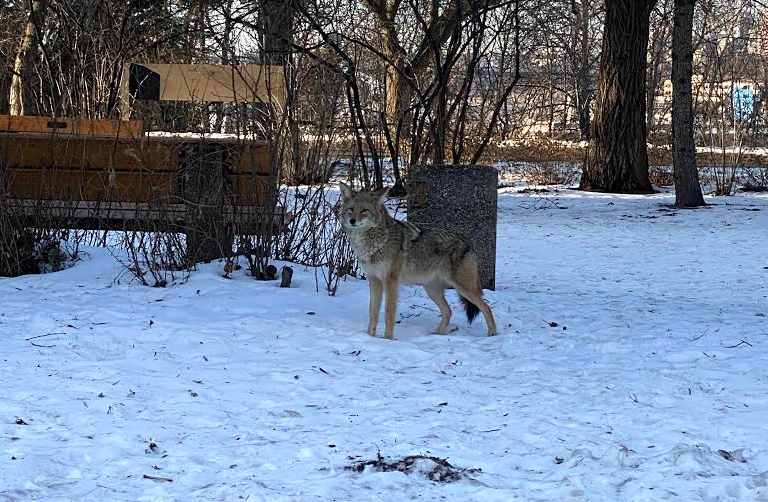A new study out of the University of Alberta shows coyotes that live in urban areas are becoming more unhealthy as they eat more human food and are seeing higher rates of a parasite that can be fatal when spread to humans.

The study, released at the end of 2020, saw a research team examine the stomach contents of nearly 100 coyotes who died in the Edmonton region.
“This study was a little less glamourous than kind of going out and observing coyotes in their habitat because we actually collected carcasses to see what was changing on the inside,” said Scott Sugden, a research assistant who was the lead author of the study.
“Urban coyotes are consuming more human food and less prey. This causes their gut bacteria to look more like human gut bacteria.”
Sugden said that compared to rural coyotes, many of the urban coyotes that were examined had less kidney fat — a sign of less nutrition — and larger spleens — a sign of a stressed immune system.
“Coyotes that are getting access to human food are less healthy,” he said. “And that potentially leads to increases in humane-coyote conflict.”
Tapeworm can spread to humans
Ecologist Colleen Cassady St. Clair supervised the study and said the urban coyotes had higher rates of a concerning tapeworm.
“There’s a 50 per cent higher prevalence in the urban animals (Sugden) studied of a parasite called Echinococcus multilocularis,” she said. “This is a tapeworm that’s occurred in North America for a long time but there’s a new strain of it that’s arrived just in the last 10 years from Europe.”

Get daily National news
Alberta Health Services says in humans, the parasite is “potentially lethal” and can cause cysts and growths in the liver. The parasite can spread to humans if they come into contact with soil that has traces of coyote feces.
“People could get this parasite by accidentally ingesting eggs from the parasite that would be shed in the feces, the poop, of coyotes.” St. Clair said. “Seventeen Albertans have been diagnosed with this parasite in the last few years.”
However, St. Clair said at this time, it’s still rare to contract the parasite.
“The likelihood of encountering these eggs is very low but it’s higher for people who work with soil. It would be higher for people whose dogs might roll around in areas where coyotes’ feces occur, and the same dogs might (then) roll around on their bed,” she said.
“Wash your hands whenever you’re out and about, contacting soil.”

‘Not the place for them to be’
Sugden said the first thing people should be doing to deter coyotes from getting too comfortable in urban areas is to make sure trash and other items that might attract them are out of reach.
“Hunting prey is hard work,” he said. “You have to find and then catch a mouse or a rodent or a rabbit… If (coyotes) learn you can come into a residential neighbourhood and get this easy source of food, (they are) going to keep doing that.
“(For) an unhealthy coyote, it’s going to be easier to keep doing that.
“If you have compost, make sure it’s secure. If you have trash, make sure it’s secure,” he said. “If we limit coyote access to human food and other attractants, if we teach them that they can’t just come into a neighbourhood and find easy food, we promote them continuing to live a natural coyote lifestyle.”
He said if you spot a coyote, don’t avoid it — try to deter it.
“Yell at it, make loud noises, make yourself look big,” Sugden said. “It’s called aversive conditioning, where we try to teach the coyotes that a neighbourhood is not the place for them to be.”
As for what strange items the scientists found in the coyotes they examined, Sugden said he found a pineapple, burrito, “plenty of fast-food wrappers,” and “a big chunk of glove.”
The study was funded by the Natural Sciences and Engineering Research Council of Canada, and included support from animal control in the City of Edmonton and Sherwood Park.
More information on coyotes in Alberta, including how to report concerns, is available from the province.







Comments
Want to discuss? Please read our Commenting Policy first.